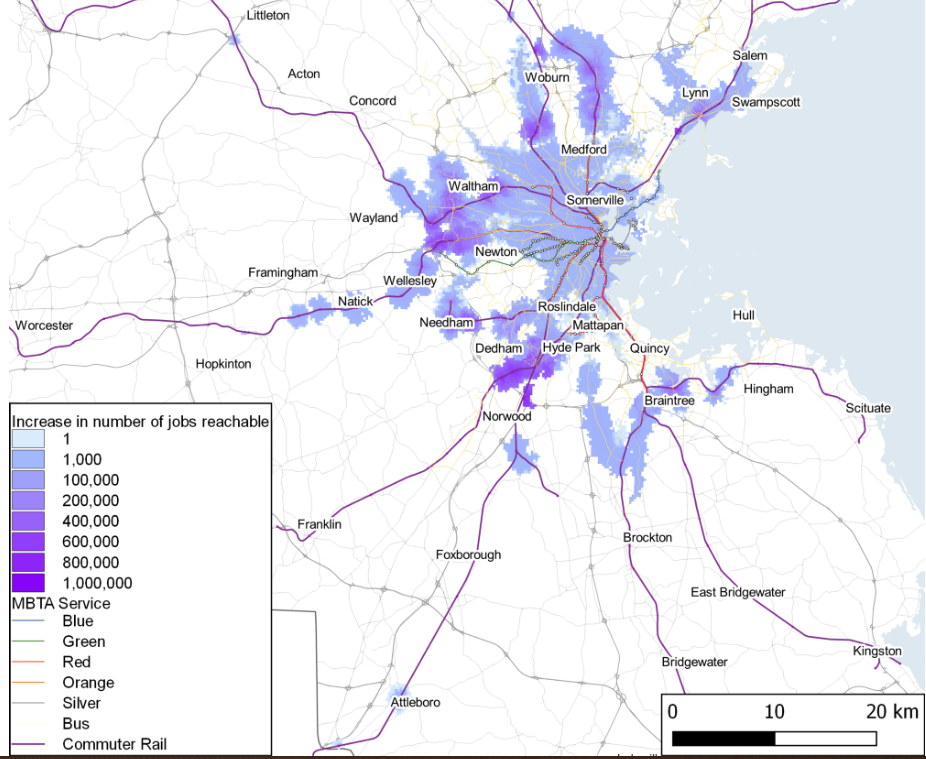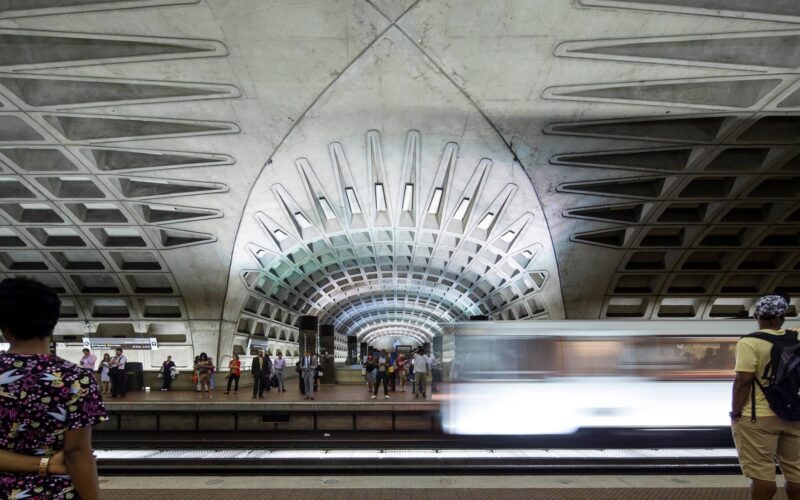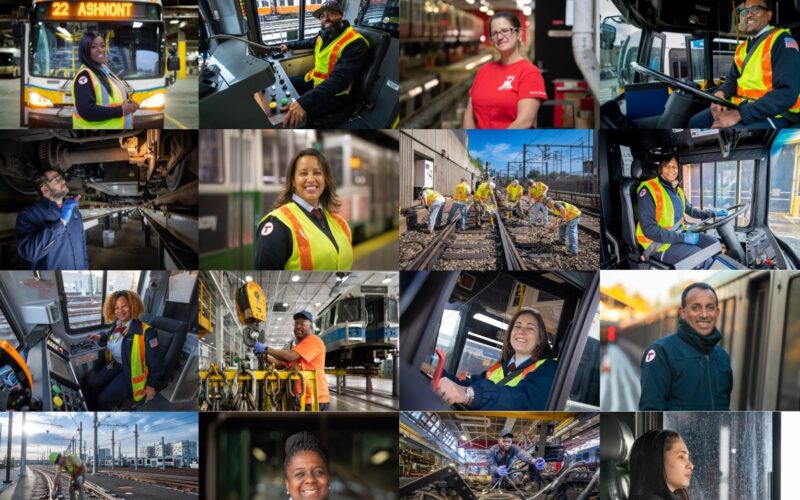

In some parts of the Boston region, lowering commuter rail fares to match the cost of a single-ride fare on the T would give people on constrained budgets new access to hundreds of thousands of jobs.
Boston’s economy has roared for the past decade, but this prosperity has been unevenly shared within the city and the region. In Boston, African-American and immigrant neighborhoods like Roslindale and Mattapan face challenges like low incomes and scarce access to fresh food. Outside of Boston, post-industrial cities like Lynn and Haverhill–referred to as “Gateway Cities” by Massachusetts policymakers–have had a slower recovery from the recession, with persistently high unemployment rates and concentrated poverty.
An opportunity to improve transit access in these cities and neighborhoods has been sitting in plain sight: The Massachusetts Bay Transportation Authority’s underutilized commuter rail lines. Like commuter rail networks elsewhere in the country, the MBTA’s rail service targets wealthy suburban commuters. Trains have premium fares and operate infrequently outside the traditional rush hour, making them less useful to second- and third-shift workers.
Commuter rail fares and service patterns can be reformed to cater to a broader base of riders. (In the event of a major disruption like this week’s Red Line derailment, these reforms would also add a measure of much-needed redundancy to the system.) Around the world, legacy suburban rail lines have been transformed into comprehensive regional rail networks that offer frequent, all-day, affordable service.
New research shows that through fare policy, the MBTA can open up opportunities for residents in struggling neighborhoods. Local advocates are fighting to overhaul rail fares and service in a campaign that could serve as a model for similar efforts to reform commuter rail in U.S. cities like New York, Chicago, and Philadelphia.
Affordable rail = Access to hundreds of thousands of new jobs
Lowering the cost of commuter rail could unlock transit access for lower-income residents, as illustrated by a recent analysis from Matthew Wigginton Conway and Anson Stewart.
In their paper, Conway and Stewart show that access to jobs would increase if the Massachusetts Bay Transportation Authority lowered the cost of a commuter rail trip within Boston and the inner suburbs to $2.25 (to match the cost of a single-ride fare on the MBTA’s subway). The researchers measured how access would change for someone who can afford $5 for a one-way commute and 60 minutes of door-to-door travel time.
In areas near commuter rail stations, this fare change would give people with constrained budgets access to hundreds of thousands of additional jobs. In Roslindale, near the MBTA’s Fairmount Line, the number of jobs accessible to someone with a limited transit budget would rise by almost 9%. In Lynn, a high-poverty “Gateway City” on the MBTA’s Newburyport/Rockport Line, the number of jobs accessible by transit would grow by more than 68%.
These projections for expanded job access capture a fraction of what’s possible if lower fares are combined with more frequent service and free transfers to subways and buses. For a model, look to Transport for London’s 2007 takeover and consolidation of suburban rail lines into the Overground, after which TfL ran more frequent service, lowered prices, and integrated fares with local transit. In four years, ridership more than doubled on the lines that TfL took over; total Overground ridership further increased due to the opening of a new rail extension.
TransitMatters’ Year of Regional Rail
In the Boston region, the advocacy group TransitMatters has led the charge for more equitable and effective regional rail since 2018, when it released a report calling for all-day frequent service, lower fares, integration with local transit, and full ADA accessibility at all commuter rail stations.
Since then, TransitMatters has been barnstorming the region to drum up support, most recently with an April forum that brought together Providence Mayor Jorge Elorza and Massachusetts politicians.
What a great crowd we had from all over #RhodeIsland and #mapoli who came out to hear about our #RegionalRail plan! Thanks to our co-hosts @GrowSmartRI and our speakers: Mayor @Jorge_Elorza, our COO @jarjoh, @PeterBrassard and @aiellobytrain. Event photo gallery is coming soon! pic.twitter.com/K6hJUDR91M
— TransitMatters (@transitmatters) April 18, 2019
Jarred Johnson, TransitMatters’ chief operating officer, said that effective regional rail would support a stronger local economy and help alleviate housing pressures. “We have a shortage of housing in Boston, but a surplus of housing and places where you can build housing in the Gateway Cities,” Johnson said. “But without good transit links, it’s not going to happen. We have to make it so that commute takes 30 or 45 minutes–people are already spending that long taking the Green Line.”
TransitMatters plans to release a follow-up report this summer calling for early action. They aim to influence three important decisions that will affect the future of commuter rail in Greater Boston: A state “rail vision” study that could recommend more frequent and faster service, the 2022 expiration of the MBTA’s contract with its current rail operator, and the MBTA’s new fare-payment system, which could be launched alongside changes to fare policy that make commuter rail more affordable.
“It’s important to rethink not just how commuter rail operates, but who it’s for,” Johnson said.
 On the Brink: Will WMATA’s Progress Be Erased by 2024?
On the Brink: Will WMATA’s Progress Be Erased by 2024?
The experience of being a WMATA rider has substantially improved over the last 18 months, thanks to changes the agency has made like adding off-peak service and simplifying fares. Things are about to get even better with the launch of all-door boarding later this fall, overnight bus service on some lines starting in December, and an ambitious plan to redesign the Metrobus network. But all of this could go away by July 1, 2024.
Read More MBTA Partners with Union to Reach Historic Wage Agreement
MBTA Partners with Union to Reach Historic Wage Agreement
The Massachusetts Bay Transportation Authority and its union, Carmen’s Local 589, reached a historic agreement to increase bus operators' starting wages from $22.21 to $30 an hour, shifting MBTA operators from the lowest paid to the highest paid in the transportation industry.
Read More